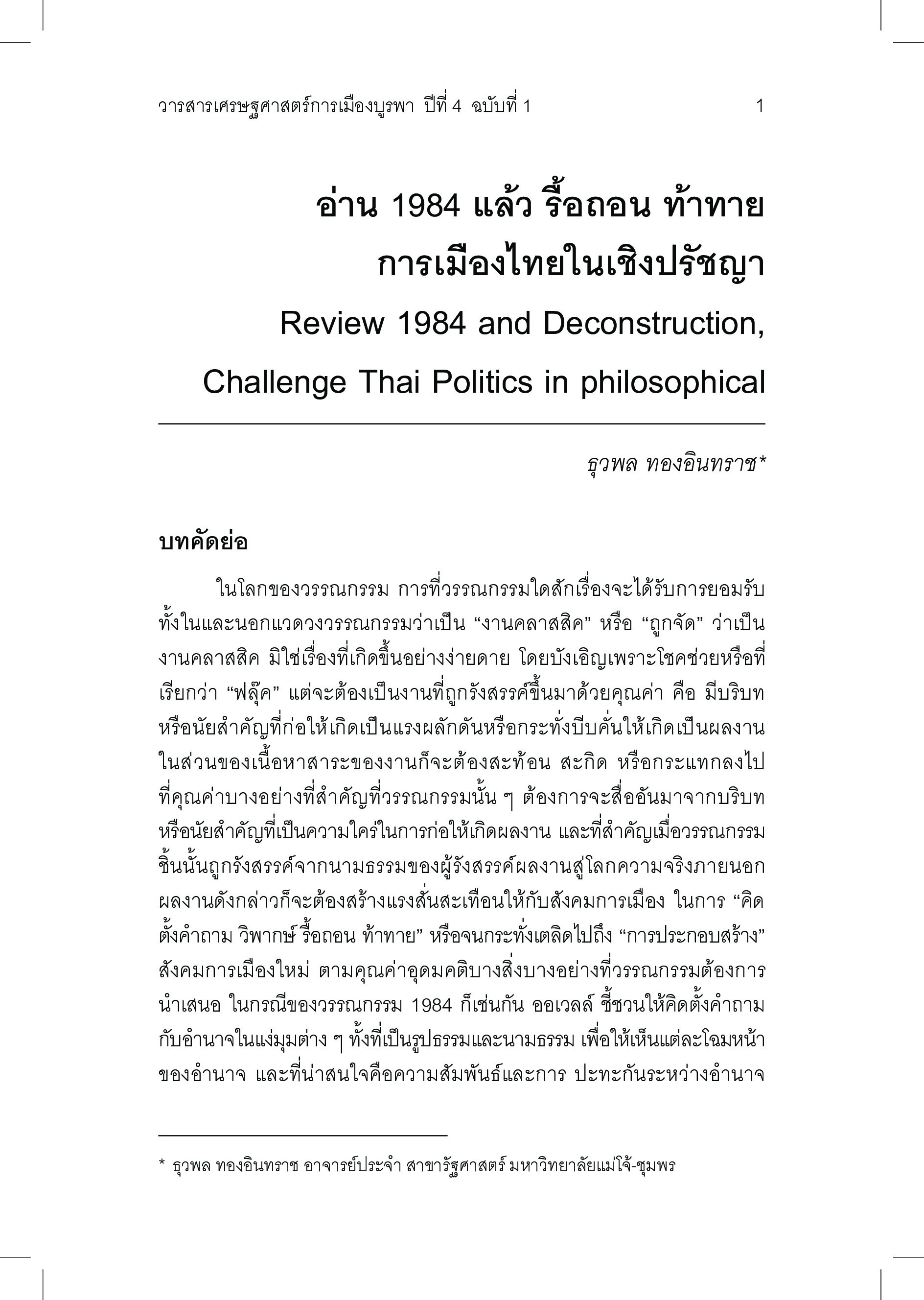Review 1984 and Deconstruction, Challenge Thai Politics in philosophical
Keywords:
1984, Deconstruction, Challenge, Thai PoliticsAbstract
In the world of literature, the literature of that time will be accepted both in and outside literary circles as “Comcast classic work” or “classified," that is a classic earphone. That are not happening easily, because of luck or by chance have been called “Fluke", but must be used to create more value. There is a context or significance, causing driving force even cars to squeeze a contribution. The content of the work, it must reflect, provoke or strike down the value of some important literature that wants to convey the significance of context or a desire to cause the result. Furthermore the major literary piece when it was created from an abstract head Pate creator of the world outside reality. Such as contributions would have to create vibrations to society. The “Critical Thinking, Questioning, Deconstruction, Challenge” or until the wild. "To build“ a new political society. According to literature values, ideals something to offer. In the case of literature in 1984, too, on Orwell's exhortations to think to question authority in various aspects, both tangible and intangible, to see the face of power and interest is the relationship and clashes between powers. Including the truth of the relationship between the state and citizens who have never been fit, whether it's a relationship based on whatever. In contrast, what seems to be the intellectual stimulation of libido in order to Orwell is very important. "The idea of power" and "power relations" in the dimension that looks upside. As a result, every camp and declared himself to be. "Free and democratic" and "non-democratic". They have turned a questioning, critical social challenges of demolition themselves enormously. Although in 1984, it becomes a bedtime story of all political camps to them.
References
กาญจนา แก้วเทพ. (2535). อิตถีศาสตร์. กรุงเทพฯ: เจนเดอร์เพรส.
จักษ์ พันธ์ชูเพชร. (2549). การเมืองการปกครองของไทย:จากยุคสุโขทัยสู่สมัยทักษิณ. พิมพ์ครั้งที่ 5. ปทุมธานี: มายด์ พับลิชชิ่ง.
จิตร ภูมิศักดิ์. (2550). โฉมหน้าศักดินาไทย. พิมพ์ครั้งที่ 10. นนทบุรี: ศรีปัญญา.
ชัยวัฒน์ สถาอานันท์. (2528). การเมืองมนุษย์: รัฐศาสตร์ทวนกระแส. กรุงเทพฯ: ดอกหญ้า.
_______. (2549). อาวุธมีชีวิต? แนวคิดเชิงวิพากษ์ว่าด้วยความรุนแรง. พิมพ์ครั้งที่ 2. กรุงเทพฯ: ฟ้าเดียวกัน.
_______. (2551). อารยะขัดขืน. พิมพ์ครั้งที่ 2. กรุงเทพฯ: มูลนิธิโกมลคีมทอง.
ชัยอนันต์ สมุทวณิช และกนก วงษ์ตระหง่าน. (2526). ภาษาการเมือง. กรุงเทพฯ: เจ้าพระยาการพิมพ์.
ไชยรัตน์ เจริญสินโอฬาร. (2553). ความคิดทางการเมืองของฌาคส์ ร็องซีแยร์. กรุงเทพฯ: สมมติ.
ธเนศ วงศ์ยานนาวา. (2541). ”ภาพตัวแทนของตูด”. ใน ปริตตา เฉลิมเผ่า กออนัตตกูล. เผยร่าง-พรางกาย: ทดลองมองร่างกายในศาสนา ปรัชญาการเมือง ประวัติศาสตร์ ศิลปะ และมานุษยวิทยา. กรุงเทพฯ: คบไฟ.
_______. (2551). เพศ: จากธรรมชาติ สู่จริยธรรม จนถึงสุนทรียะ. กรุงเทพฯ: มติชน.
_______. (2554). ใต้เตียงนักดนตรี เล่ม1. กรุงเทพฯ: โอเฟ่นบุ๊กส์.
ธนภน วัฒนกุล. (2550). การเมืองเรื่องพื้นที่ พลวัตทางสังคมของชุมชน (กรณีศึกษา: ชุมชนป้อมมหากาฬ). พิมพ์ครั้งที่ 3. กรุงเทพฯ: มูลนิธิสถาบันวิชาการ 14 ตุลาคม.
ธีรยุทธ บุญมี. (2551). การปฏิวัติสัญศาสตร์ของโซซูร์เส้นทางสู่โพสต์โมเดอร์นิสต์. กรุงเทพฯ: วิภาษา.
นรชิต จิรสัทธรรม. (2553). โพสต์โมเดิร์นกับเศรษฐศาสตร์: บทวิพากษ์สมมติฐานความมีเหตุผลทางเศรษฐศาสตร์. กรุงเทพฯ: วิภาษา.
บาร์ตส์, โรล็องด์. (2551). มายาคติ. แปลโดย วรรณพิมล อังคศิริสรรพ และนพพร ประชากุล. พิมพ์ครั้งที่ 3. กรุงเทพฯ: คบไฟ.
บูร์ดิเยอ, ปิแยร์. (2550). เศรษฐกิจของทรัพย์สินเชิงสัญลักษณ์. แปลโดย ชนิดา เสงี่ยมไพศาลสุข และนพพร ประชากุล. กรุงเทพฯ: คบไฟ.
ประภาส ปิ่นตบแต่ง. (2552). กรอบการวิเคราะห์การเมืองแบบทฤษฎีขบวนการทางสังคม. เชียงใหม่: มูลนิธิไฮน์ริค เบิลล์ สำนักงานภูมิภาคตะวันออกเฉียงใต้.
พระราชวรมุนี (ประยูร ธมฺมจิตโต). (2544). ปรัชญากรีก: บ่อเกิดภูมิปัญญาตะวันตก. พิมพ์ครั้งที่ 5.กรุงเทพฯ: ศยาม.
มาลินี คุ้มสุภา. (2548). อนุสาวรีย์ประชาธิปไตยกับความหมายที่มองไม่เห็น. กรุงเทพฯ: วิภาษา.
สุภางค์ จันทวานิช. (2553). ทฤษฎีสังคมวิทยา. พิมพ์ครั้งที่ 3. กรุงเทพฯ: จุฬาลงกรณ์มหาวิทยาลัย.
สุลักษณ์ ศิวรักษ์. (2526). ไม้ซีกงัดไม้ซุง. กรุงเทพฯ: เคล็ดไทย.
_______. (2546). นักปรัชญาการเมืองฝรั่ง. พิมพ์ครั้งที่ 4. กรุงเทพฯ: ศึกษิตสยาม.
_______. (2548). “ความสูงสุดแห่งศาสตร์การเมือง”. ใน เอกสารการสอนชุดวิชาปรัชญาการเมือง. นนทบุรี: มหาวิทยาลัยสุโขทัยธรรมาธิราช.
เสกสรรค์ ประเสริฐกุล. (2548). การเมืองภาคประชาชนในระบอบประชาธิปไตยไทย. กรุงเทพฯ: อมรินทร์.






